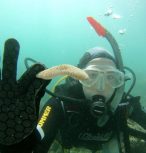DNA reveals the past and future of coral reefs
New DNA techniques are being used to understand how coral reacted to the end of the last ice age in order to better predict how they will cope with current changes to the climate. James Cook Univer

From 2005 to 2022, the main node of the ARC Centre of Excellence for Coral Reef Studies was headquartered at James Cook University in Townsville, Queensland (Australia)








Abstract:
Coral reefs are among the world’s most biodiverse, yet most threatened ecosystems. Climate change is greatly compounding local anthropogenic stressors, with many reefs transitioning from coral–dominant to less functional states. These changes in benthic habitat alter the abundance and composition of reef-associated organisms and their subsequent interactions. Of particular importance to ecosystem function are the interactions between parasites, their hosts and their environment. Due to reductions in habitat condition, altered host-parasite interactions have affected ecosystem function and disease prevalence in terrestrial and coastal systems. Reductions in habitat condition can therefore create negative feedbacks that may further affect ecosystem function. To date, the effects of habitat condition on host-parasite interactions have not been investigated on coral reefs. The objective of my PhD is to investigate how the condition of coral reef habitats affects parasitism of coral reef fishes. This project will further understanding of how parasite community structure, infective capacity and consequently fish health are influenced by the reduced condition of coral reefs. Through this research I aim to identify those parasitic life histories that are most resilient to habitat degradation, pose the greatest threat to fish populations on degraded coral reefs and to elucidate the key drivers causing shifts in parasitic assemblages along a gradient of coral reef health.
Biography:
Katie grew up in the North of England, spending most of her free-time living abroad and diving the world’s oceans. She graduated from the University of Edinburgh in 2012 with a BSc in Geography and took to the skies once more, dreaming of diving and studying on the Great Barrier Reef. In 2014 Katie obtained her MSc in Marine Biology & Ecology at James Cook University, investigating the capacity for thermal developmental acclimation in three tropical wrasse species. After spending two years working in various research positions: as a research assistant for Prof. Philip Munday; as a Research Projects Officer with CSIRO in Brisbane; and researching the effects of Cyclone Winston on coral reefs in Fiji, Katie returned to her academic nest at JCU to begin her next adventure. Under the supervision of Dr Andrew Hoey and Dr Kate Hutson, Katie’s PhD looks at the effects of reduced coral reef condition on the parasite communities infecting herbivorous fish on the Great Barrier Reef.
New DNA techniques are being used to understand how coral reacted to the end of the last ice age in order to better predict how they will cope with current changes to the climate. James Cook Univer
A new study on the effects of climate change in five tropical countries has found fisheries are in more trouble than agriculture, and poor people are in the most danger. Distinguished Profess
James Cook University researchers have found brightly coloured fish are becoming increasingly rare as coral declines, with the phenomenon likely to get worse in the future. Christopher Hemingson, a
Researchers working with stakeholders in the Great Barrier Reef region have come up with ideas on how groups responsible for looking after the reef can operate more effectively when the next bleaching
Abstract: As marine species adapt to climate change, their heat tolerance will likely be under strong selection. Individual variation in heat tolerance and its heritability underpin the potential fo
Abstract: The Reef Ecology Lab in KAUST’s Red Sea Research Center explores many aspects of movement ecology of marine organisms, ranging from adult migrations to intergenerational larval dispersal
Abstract: Macroalgal meadows are a prominent, yet often maligned component of the tropical seascape. Our work at Ningaloo reef in WA demonstrate that canopy forming macroalgae provide habitat for ad
Abstract: Sharks are generally perceived as strong and fearsome animals. With fossils dating back at least 420 million years, sharks are not only majestic top predators but they also outlived dinosa
Abstract: Connectivity plays a vital role in many ecosystems through its effects on fundamental ecological and evolutionary processes. Its consequences for populations and metapopulations have been
Abstract: Evolution of many eukaryotic organisms is affected by interactions with microbes. Microbial symbioses can ultimately reflect host’s diet, habitat range, and even body shape. However, how
Abstract: The past few years have seen unprecedented coral bleaching and mortality on the Great Barrier Reef (GBR) but the consequences of this on biodiversity are not yet known. This talk will expl